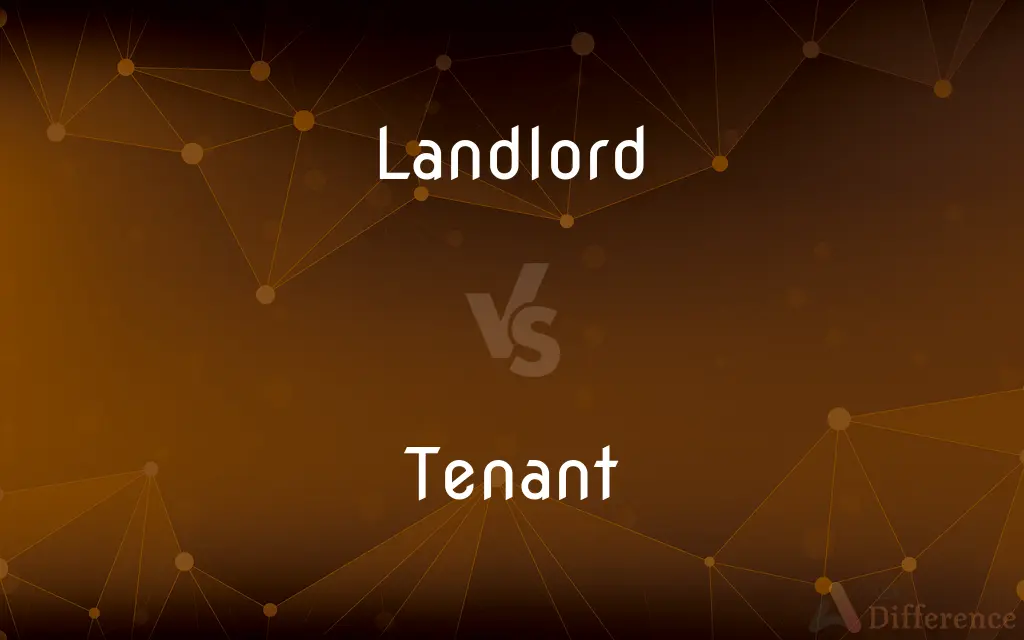Landlord vs. Tenant — What's the Difference?
By Tayyaba Rehman & Fiza Rafique — Published on October 23, 2023
A Landlord owns property and rents it out to Tenants, who pay rent to use or occupy that property. The Landlord is responsible for property maintenance, while the Tenant is responsible for abiding by the lease terms.

Difference Between Landlord and Tenant
Table of Contents
ADVERTISEMENT
Key Differences
A Landlord is an individual or entity that owns real estate property and rents or leases it out to another party, known as a Tenant. The Tenant pays rent, often on a monthly basis, to occupy or use the property. These roles are established through a legal contract known as a lease agreement.
Landlords are generally responsible for maintaining the property, which may include tasks such as repairs, upkeep, and ensuring the property complies with local housing codes. Tenants, on the other hand, are responsible for abiding by the terms set in the lease, which may include timely rent payment and not causing damage to the property.
The rights and obligations of both Landlords and Tenants are often governed by state laws, and sometimes local ordinances. Landlords, for example, have the right to collect rent and even evict Tenants for violations like non-payment. Tenants have rights too, such as the right to a habitable living environment and the right to not be discriminated against.
Landlords can also set specific conditions for leasing the property, like security deposits, pet policies, and rent due dates. Tenants must adhere to these terms or risk facing penalties, which can include fines or even eviction. Both Landlords and Tenants have the capability to terminate the lease under conditions specified in the agreement.
Comparison Chart
Role
Owner of the property
Renter of the property
ADVERTISEMENT
Financial
Receives rent
Pays rent
Maintenance
Responsible for property upkeep
Responsible for individual living space
Legal Power
Can evict
Can terminate lease under certain conditions
Lease Agreement
Sets terms and conditions
Agrees to terms and conditions
Compare with Definitions
Landlord
Owner of rental property
The Landlord owns the apartment complex.
Tenant
Pays rent to the landlord
The Tenant makes monthly payments.
Landlord
Rents property to tenants
The Landlord sets the monthly rent.
Tenant
Renter of property
The Tenant rents the apartment.
Landlord
Holds legal rights to property
The Landlord can sell or lease the property.
Tenant
Occupies leased property
The Tenant moved in last week.
Landlord
Responsible for upkeep
The Landlord fixed the broken elevator.
Tenant
Abides by lease terms
The Tenant is not allowed to keep pets.
Landlord
Can enforce lease terms
The Landlord can evict for non-payment of rent.
Tenant
Can have limited modification rights
The Tenant installed curtain rods.
Landlord
One that owns and rents land, buildings, or dwelling units.
Tenant
One that pays rent to use or occupy land, a building, or other property owned by another.
Landlord
A man who runs a rooming house or an inn; an innkeeper.
Tenant
A dweller in a place; an occupant.
Landlord
A person that leases real property; a lessor.
Tenant
To hold as a tenant or be a tenant.
Landlord
The owner or manager of a public house.
Tenant
One who holds a lease (a tenancy).
Landlord
A shark, imagined as the owner of the surf to be avoided.
Tenant
(by extension) One who has possession of any place.
Landlord
The lord of a manor, or of land; the owner of land or houses which he leases to a tenant or tenants.
Tenant
(computing) Any of a number of customers serviced through the same instance of an application.
Multi-tenant hosting
Landlord
The master of an inn or of any form of lodging house; as, the landlord collects the rents on the first of the month.
Upon our arrival at the inn, my companion fetched out the jolly landlord.
Tenant
One who holds a feudal tenure in real property.
Landlord
A landowner who leases to others
Tenant
One who owns real estate other than via allodial title.
Tenant
Misconstruction of tenet
Tenant
To hold as, or be, a tenant.
Tenant
(transitive) To inhabit.
Tenant
One who holds or possesses lands, or other real estate, by any kind of right, whether in fee simple, in common, in severalty, for life, for years, or at will; also, one who has the occupation or temporary possession of lands or tenements the title of which is in another; - correlative to landlord. See Citation from Blackstone, under Tenement, 2.
Tenant
One who has possession of any place; a dweller; an occupant.
The hhappy tenant of your shade.
The sister tenants of the middle deep.
Tenant
To hold, occupy, or possess as a tenant.
Sir Roger's estate is tenanted by persons who have served him or his ancestors.
Tenant
Someone who pays rent to use land or a building or a car that is owned by someone else;
The landlord can evict a tenant who doesn't pay the rent
Tenant
A holder of buildings or lands by any kind of title (as ownership or lease)
Tenant
Any occupant who dwells in a place
Tenant
Occupy as a tenant
Common Curiosities
Who pays the rent?
The Tenant pays the rent to the Landlord.
Who is responsible for maintenance?
The Landlord is generally responsible for property maintenance.
What is a Landlord?
A Landlord is the owner of property that is rented or leased to a Tenant.
Can a Landlord evict a Tenant?
Yes, a Landlord can evict a Tenant under specific legal conditions.
Can a Tenant modify the property?
Modifications by the Tenant are usually subject to Landlord approval.
What is a Tenant?
A Tenant is an individual or entity that rents property from a Landlord.
Can a Tenant break the lease?
A Tenant can break the lease under conditions specified in the agreement.
Who sets the lease terms?
The Landlord sets the lease terms which the Tenant agrees to.
What legal rights do Landlords have?
Landlords have the right to collect rent and enforce lease terms.
Who holds the security deposit?
The Landlord holds the security deposit until the Tenant moves out.
Who can terminate the lease?
Both the Landlord and Tenant can terminate the lease under specified conditions.
What legal protections do Tenants have?
Tenants have various legal protections, including the right to a habitable environment.
Who initiates the lease agreement?
The Landlord usually initiates the lease agreement.
What happens if a Tenant doesn't pay rent?
The Landlord may initiate eviction proceedings for non-payment of rent.
Can a Tenant sublet the property?
Subletting is subject to the terms of the lease and Landlord approval.
Share Your Discovery

Previous Comparison
CEO vs. Executive Director
Next Comparison
NADH vs. NADPHAuthor Spotlight
Written by
Tayyaba RehmanTayyaba Rehman is a distinguished writer, currently serving as a primary contributor to askdifference.com. As a researcher in semantics and etymology, Tayyaba's passion for the complexity of languages and their distinctions has found a perfect home on the platform. Tayyaba delves into the intricacies of language, distinguishing between commonly confused words and phrases, thereby providing clarity for readers worldwide.
Co-written by
Fiza RafiqueFiza Rafique is a skilled content writer at AskDifference.com, where she meticulously refines and enhances written pieces. Drawing from her vast editorial expertise, Fiza ensures clarity, accuracy, and precision in every article. Passionate about language, she continually seeks to elevate the quality of content for readers worldwide.












































